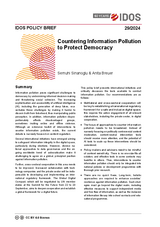Policy Brief
Countering information pollution to protect democracy
Sinanoglu, Semuhi / Anita BreuerPolicy Brief (29/2024)
Bonn: German Institute of Development and Sustainability (IDOS)
DOI: https://doi.org/10.23661/ipb29.2024
Information pollution poses significant challenges to democracy by undermining informed decision-making and threatening social cohesion. The increasing sophistication and accessibility of artificial intelligence (AI), including the generation of deep fakes, exacerbates these challenges by making it harder to discern truth from falsehood, thus manipulating public perception. In addition, information pollution disproportionately affects disadvantaged groups, sometimes inciting online and offline violence. Although an extensive toolkit of interventions to counter information pollution exists, the current debate is narrowly focused on content regulation.
Several international initiatives have emerged aiming to safeguard information integrity in the digital space, particularly during elections. However, diverse national approaches to data governance and the ongoing worldwide trend of autocratisation make it challenging to agree on a global, principled position against information pollution.
Further, cross-sectoral cooperation in this area needs to be improved. Increased collaboration with technology companies and the private sector will be indispensable to developing and implementing an international regulatory framework. The Global Digital Compact, which will be negotiated by UN member states at the Summit for the Future from 22 to 23 September, aims to deepen cooperation and establish a global framework for a digital future.
This policy brief presents international initiatives and critically discusses the tools available to combat information pollution. Our recommendations are as follows:
• Multilateral and cross-sectoral cooperation will be key to establishing a transnational regulatory framework for a safe and inclusive digital space; this requires the active engagement of all relevant stakeholders, including the private sector, in digital cooperation.
• The focus of approaches to counter information pollution needs to be broadened. Instead of narrowly focusing on politically controversial content moderation, content-neutral intervention tools should receive more attention, and the potential of AI tools to scale up these interventions should be considered.
• Policy-makers and advisors need to be mindful of context sensitivity. There is no one-size-fits-all solution, and effective tools in some contexts may backfire in others. Thus, interventions to counter information pollution should only be integrated into national policies or development programmes with thorough prior research.
• There are no quick fixes. Long-term, holistic approaches are required to enhance societies’ resilience against information pollution. Such strategies must go beyond the digital realm, including effective measures to support independent media and free flow of information, as well as the inclusion of information literacy into school curricula and educational programmes.
Contact
Cornelia Hornschild
Publication Coordinator
E-mail Cornelia.Hornschild@idos-research.de
Phone +49 (0)228 94927-135
Fax +49 (0)228 94927-130
Alexandra Fante
Librarian/ Open Access Coordinator
E-Mail Alexandra.Fante@idos-research.de
Telefon +49 (0)228 94927-321
Fax +49 (0)228 94927-130




![[Translate to English:] Photo: Alexandra Fante, Bibliothekarin/Open Access-Koordinatorin](/fileadmin/_processed_/f/0/csm__c_Deutsches-Institut-fuer-Entwicklungspolitik_Fante_94ce4fa1ba.jpg)